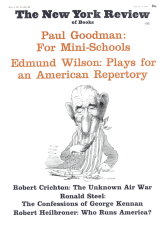In response to:
The War Game from the October 26, 1967 issue
To the Editors:
Whatever the faults of Wyndham Lewis’s autobiography may be, surely it is unfair to pile on his head a botched job of republication ten years after the author’s death. And surely if D.A.N. Jones intends his review of Blasting and Bombardiering to be taken seriously, he ought to have looked at the original version, which Lewis did see through the press. He would not find there “Cantleman’s Springmate,” which he admires, or “The War Baby,” both stories having been written twenty years before Blasting and Bombardiering and certainly not intended ever to accompany the more journalistic autobiography. Lewis frequently pointed—defensively perhaps, but not inaccurately—to the difference between his hastily composed, popularly aimed work, the Blasting and Bombardiering sort of thing, and his genuine artistic efforts, such as Tarr, The Childer-mass, and stories like “Cantleman.” The ribald stance of the Bombardier-pundit may well bore or annoy today’s intellectual; but it seems frivolous, if not irresponsible, of your reviewer to disregard completely the author’s sense of what he was doing in these various kinds of writing now so crudely stuck together.
W. K. Rose
London
D.A.N Jones replies:
Mr. Rosenthal quotes from page 121. He should turn back, past the pictures of helmet and sombrero, to page 120. Let me lead up to it. “You must not miss a war when one is going! You cannot afford to miss that experience…. All these comic diversions of ours represent ideas, that’s the great thing. They are first-class comedy, because they are forces of nature dressed up in exciting national costumes…I have slept soundly through scores of fulldress bombardments… As time went on, I found that there was one situation in which I did not at all enjoy finding himself. I did not like to be submitted to indiscriminate shell-fire when undressed.” No mention of feet. No mention of trousers either. This book is full of references to the trousers of others (George Moore, T.S. Eliot etc.), but never Lewis’s—except indirectly. Thus, when questioned by a senior officer, he complains “I understood what it must feel like to be a butler and to be inopinely cross-questioned about his sexual life or the conditions of his bowels by a snobbish master. It was as brutal as surprising a Court Chamberlain in his socks and pants: my private life should be respected.”
He admits that he “preferred a helmet to a head of hair.” Why? When he got his pretty uniform (“old-gold khaki”), he boasted: “I was now an officer. I passed into a more abstract class.” This relates to his racialism. In Rude Assignment, he wrote: “Men find their greatest happiness in type-life. Some strongly marked occupational type—the helmeted “Bobbie,” the barrister with his wig, the schoolmaster with his mortarboard and cane; or pronounced national type….”
Punishment, racialism, uniforms…I know nothing of psychology, but would gladly have subscribed to buy Wyndham Lewis a codpiece.
I did not “pile on Lewis’s head a botched job of republication.” I said: “this reprint is edited with an incompetence worthy of the author.” Mr. Rose reminds us that Lewis himself thought little of the work in question. I am interested to learn that he called it “journalistic” and “popularly aimed.” I would call it simply “bad,” while agreeing that much of Lewis’s writing is simply “good.” Terms like “journalistic” and “artistic” are not much help here.
This Issue
January 4, 1968



